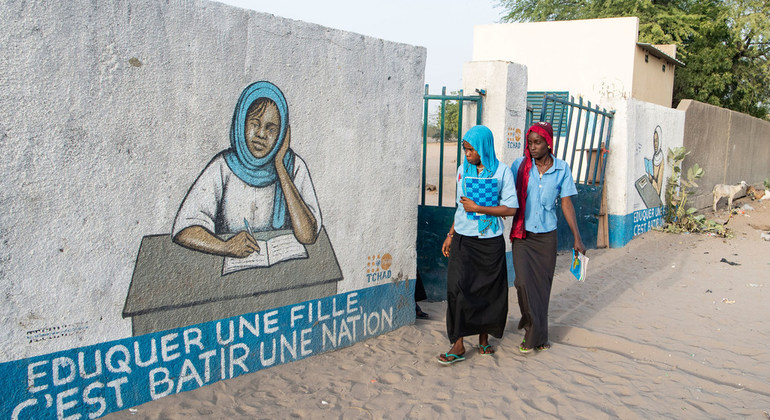Partnerships are key
Education enhances the “analytical, inventive and critical thinking capacities of human beings”, the Assembly President said, adding that in the process, it accelerates each nation’s technological attainments and economic growth.
“When a society remains perpetually under-developed, it must among other things re-evaluate its education system”, said Mr. Muhammad-Bande. “If the system is dysfunctional or does not facilitate the acquisition of pertinent knowledge and skills, the economy will, at best, stagnate, and at worst, collapse”.
Bearing in mind the “tremendous amount of work” that lies ahead, he shared his belief that partnerships can play an important role in implementing and attaining the SDGs, which is why his office “has placed strong emphasis on engendering partnerships across key priority areas”, including education.
In conclusion, Mr. Muhammad-Bande urged Member States and other key partners to examine the feasibility and value-added support in establishing a network of key existing education networks to exchange information and ideas, “including sources of support, relating to all aspects of education”.
Power of education
“Education has the power to shape the world”, Deputy Secretary-General Amina Mohammed spelled out at the podium.
“Education protects men and women from exploitation in the labour market” and “empowers women and gives them opportunities to make choices”, she said.
Moreover, it can help change behaviour and perceptions, thereby fighting climate change and unsustainable practices. A quality experience in the classroom helps promote mutual respect and understanding between people; combat misperceptions, prejudice and hate speech; and prevent violent extremism.
“Without education, we cannot achieve any of the SDGs”, Ms. Mohammed flagged.
And yet, with 2030 looming on the horizon, the world is lagging behind, prompting the Secretary-General to issue a global call for a Decade of Action, to accelerate the implementation of the SDGs.
“The situation in education is alarming…because of the crisis in the number of children, young people and adults who are not in education”, as well as because many who are, are not learning.
And refugees and migrants face additional challenges.
According to the UN Office of the High Commissioner for Refugees (UNHCR), the proportion of refugees enrolled in secondary education is 24 per cent, only three per cent of whom have access to higher education.
“We have the power to shape education, but only if we work together and really bring the partnerships that are necessary to provide quality education”, she concluded. “We have a duty to step up our efforts, so that quality education for all is no longer a goal for tomorrow, but a reality”.
Invest in education
Action for “the four Ps on which our future depends”, namely people, prosperity, the planet and peace, is imperative, according to the head of the UN Educational, Scientific and Cultural Organization, UNESCO in her Friday message.
Although education is “a valuable resource for humanity”, Director-General Audrey Azoulay pointed out that it is “all too scarce for millions of people around the world”.
A global learning crisis, confirmed by the UNESCO Institute for Statistics, is a major cause for concern as it is also a crisis for prosperity, for the planet, for peace and for people”, she said, urging everyone to take action for education “because education is the best investment for the future”.
UNESCO has been charged with coordinating the international community’s efforts to achieve SDG 4, quality education for all.
“First and foremost”, the UNESCO chief said, “our Organization takes action for people, by making education an instrument of inclusion and, therefore, of empowerment”.
Changing lives, transforming communities
For her part, Mona Juul, President of the UN Economic and Social Council, ECOSOC, maintained that education is “the most powerful means to escape poverty”.
“It changes lives, transforms communities and paves the way towards productive, sustainable and resilient societies in which children – girls and boys – can reach their full potential”, she expanded, urging everyone to strengthen their efforts to manifest a world in which every child receives a quality education that allows growth, prosperity, empowerment and so they can “make meaningful contributions to communities big and small, everywhere”.



